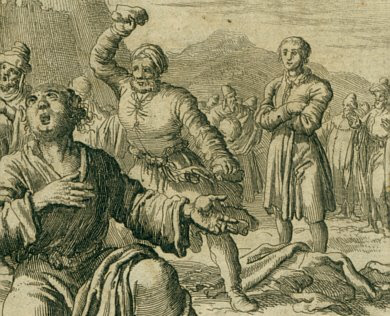Religion or Christ
Listen to Acts Chapter 9 ![]()
or read "Road to Damascus"
Going back for a moment to the stoning of Stephen we read this.
And Saul approved of their killing him. On that day a great persecution broke out against the church in Jerusalem, and all except the apostles were scattered throughout Judea and Samaria. Godly men buried Stephen and mourned deeply for him. But Saul began to destroy the church. Going from house to house, he dragged off both men and women and put them in prison. (Acts 8:1-3)This from the passage we read here.
Meanwhile, Saul was still breathing out murderous threats against the Lord's disciples. He went to the high priest and asked him for letters to the synagogues in Damascus, so that if he found any there who belonged to the Way, whether men or women, he might take them as prisoners to Jerusalem. As he neared Damascus on his journey, suddenly a light from heaven flashed around him. He fell to the ground and heard a voice say to him, "Saul, Saul, why do you persecute me?"
 This man named Saul became the Apostle Paul (Acts 13:9). I am always blown away when I think about who God choses to write slightly less than half of the books of the New Testament. If you look at the New Testament by number of words Paul is the second most prolific contributor. Luke is considered the most prolific contributor with his two books, the Gospel of Luke and the book of Acts, which amount to about a third of the New Testament. It is interesting to note that much of Acts is about Paul and his travels. A total of thirteen letters are attributed to Paul with some debate on a couple.
This man named Saul became the Apostle Paul (Acts 13:9). I am always blown away when I think about who God choses to write slightly less than half of the books of the New Testament. If you look at the New Testament by number of words Paul is the second most prolific contributor. Luke is considered the most prolific contributor with his two books, the Gospel of Luke and the book of Acts, which amount to about a third of the New Testament. It is interesting to note that much of Acts is about Paul and his travels. A total of thirteen letters are attributed to Paul with some debate on a couple.Greg Laurie is pastor at Harvest Christian Fellowship in Riverside, California. He wrote this in his Harvest Daily devotional for February 14, 2007.
 We know from reading about Saul, or Paul, that he was raised in a strict Jewish home. This meant that he would have learned the Scriptures from youth. His family sprang from the best soil, the tribe of Benjamin, where Israel’s first king, Saul, came from. No doubt young Saul was named after him.
We know from reading about Saul, or Paul, that he was raised in a strict Jewish home. This meant that he would have learned the Scriptures from youth. His family sprang from the best soil, the tribe of Benjamin, where Israel’s first king, Saul, came from. No doubt young Saul was named after him. Saul decided to become a Pharisee, which was a religious order. This meant that he would subject himself to strict discipline. His entire life essentially would be governed not only by Scripture, but by the various laws given by the rabbis. It was a radical commitment to make.
We also know that Saul was schooled by the famous Gamaliel, known as the teachers’ teacher and famed for his wisdom and understanding. Gamaliel personally took an interest in young Saul and taught him the things of God. The young man had a ravenous hunger for knowledge. He wanted to be as devout as possible.
So how was it that a man who was so religious ultimately became nothing more than a common murderer? It is because religion can be blinding. Religion can be a destructive force. Religious people conspired to put Jesus to death. And religious people put young Stephen to death as well.
When I say “religion,” I am not talking about faith in Christ; I am talking about religion. There is a big difference between manmade religion and true faith in Christ.
I think religion is probably keeping more people from Christ than everything else put together, because it gives them a false sense of security. But they will be in for a big shock when they find out that religion will not satisfy the requirements of a holy God."
The partial image above in this post is from an etching in a book published in 1660 titled The Martyrs Mirror. Jan Luiken (1649-1712) made the etchings in the Martyrs Mirror. The man standing off in the background. This is Saul also known as Paul.
0 comments:
Subscribe to:
Post Comments (Atom)